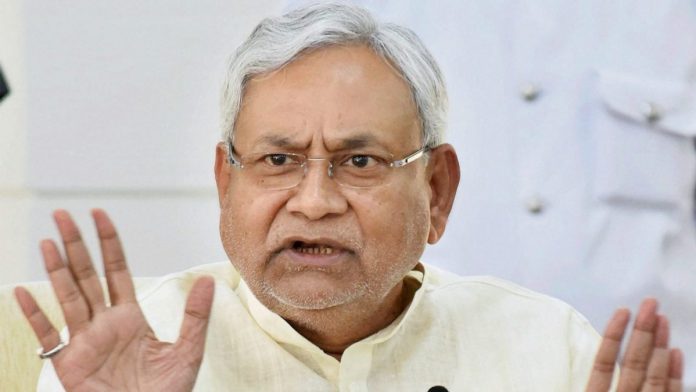Bihar Chief Minister Nitish Kumar, while making attempts to underplay the illicit hooch tragedy in his state that has officially claimed 40 lives (unofficial estimates are higher), has point blank refused to pay any compensation to the families of the victims.
His contention is that in a state where prohibition is in force since the past several years, those who consumed this poisonous brew were themselves to blame and the government had no role in their death.
The question that arises is, when there is a total ban on the sale or consumption of any kind of alcoholic substance, how was this illicit hooch available? What were the district authorities and police doing and why were they not able to ensure the implementation of the government policy in their area? Should they not be charge with negligence and abetment? This is where the Chief Minister has to realise that he cannot absolve his administration of the responsibility.
When Nitish had announced prohibition, no other than Prime Minister Narendra Modi had described it as “a very courageous step”. This was sometime in 2017, when the BJP was an ally of the government. Narendra Modi, who served as the Chief Minister of Gujarat, where prohibition has been in force, knew that consumption of hooch was extremely difficult to stop. Even during his tenure, there had been multiple cases where a large number of people died after drinking spurious liquor.
However, under the changed political equations in Bihar, the BJP is targeting Nitish Kumar for his failure to implement the liquor policy. There have been several incidents where illicit hooch has killed people or blinded many for the rest of their lives but they could have gone unreported since the victims’ families are always fearful of what the administration may do.
It is not that despite complete prohibition, liquor is not available in the states where it is operational. In Gujarat, with the right contacts, one can get any brand of alcohol delivered to one’s hotel room as well. A similar mechanism perhaps exists in Bihar as well. Prohibition was enforced in Gujarat soon after it was carved out of the old Bombay state in 1960 and successive governments have upheld the initial decision.
Many other states have also tried to experiment with prohibition. In Haryana, for instance, during the Chief Ministership of Bansi Lal in 1996, prohibition was declared. However, this did not prevent people from drinking, and liquor smuggling became a very lucrative business. The charge was that those in power made big money by patronizing liquor smugglers.
Under immense pressure from his constituents, Bansi Lal was forced to withdraw this policy. This was the beginning of big-time crime in the state which was once considered to be amongst the safest regions in the country. The smugglers and their henchmen were left with no work and resorted to criminal activity.
Cases of carjacking suddenly went up, with the criminals showing preference for Maruti Zen, which was very popular during that time. There were instances where those leaving Delhi in the wee hours of the morning would be even waylaid on the GT-Karnal road by miscreants and robbed of their cars and belongings. Bansi Lal admitted in the Assembly that Zen was a favourite of the carjackers and he had ordered a crackdown on the criminals.
Haryana has always been amongst the states which have a robust and a progressive liquor policy. The joke is that if you are travelling anywhere in Haryana, particularly Gurugram, the signage of the road may not be visible but in the thickest of winter fogs, one cannot miss out on a neon sign pointing towards a liquor vend.
Prohibition was introduced in Tamil Nadu during the Emergency by Chief Minister M.G. Ramachandran. There was a lot of opposition to the move and many consumers claimed that in the next election MGR would be defeated and Karunanidhi would return and restore the old system. MGR remained the CM and subsequently revised the policy.
Liquor has always been considered as the source of huge revenue for all states and it is only Gujarat which despite a huge loss on this count has managed to keep itself ahead of many other provinces. Bihar too is incurring this loss but is not willing to at this point revise its policies.
Delhi has been a classic case where public sector undertakings meant for other purposes, have been selling liquor to boost their and the government’s revenue. For instance, why should the DSIIDC meant for promoting industries and related infrastructure or Delhi Tourism be selling liquor? This was not the objective for these corporations to be set up.
The rates of alcohol differ from state to state and this is also one of the reasons why adulterated liquor enters the market. The taste of many brands also differs from state to state and this phenomenon cannot be explained satisfactorily. This leads to a situation where people carry liquor from one state to the other, particularly if they are travelling by road.
The Bihar hooch tragedy is very disturbing and should not be repeated. For this to happen either the state government must ensure complete implementation holding district authorities responsible or some sort of review should be carried out. It is difficult to imagine that when mercury touches low points, people would not be drinking. Without being critical of any policy, such a scenario appears to be completely unrealistic. Between us.
Nitish cannot be absolved from hooch tragedy
- Advertisement -

